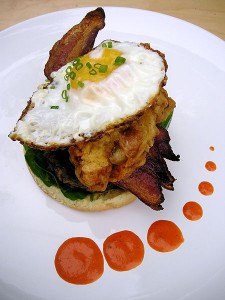
One of the most popular trends in the food industry over the last decade has been Sriracha. In case you still aren’t sure exactly what it is, Sriracha is a chili sauce made from chili peppers, distilled vinegar, garlic, sugar, and salt. It originated in Thailand and was brought to the United States by Thai immigrants. One of these immigrants, David Tran, began selling the sauce under his Huy Fong Foods brand, which uses a distinctive rooster as its logo. Tran sought trademark registration on his rooster logo, but never on the name Sriracha itself. Now, as the popularity of the sauce has exploded, major players are bringing their own Sriracha sauce to the market, leaving one to wonder if Tran missed out on a huge commercial opportunity.
Sales of Huy Fong Sriracha have taken off, growing by $20 million over the last two years. While Tran’s company is not suffering, competition is stiffening as companies like Heinz and McIlhenny Co., the maker of Tabasco sauce, are looking to capitalize on the Sriracha craze. Both companies have plans to release their own line of Sriracha chili sauce in the near future. So with everyone jumping on the bandwagon, could Tran have protected the Sriracha name by filing a trademark application?
Eastland Food Corporation has asserted that the Thai brand of hot sauce, Sriraja Panich, which Eastland distributes, is the original “sriracha sauce” and was created in Si Racha, Thailand in the 1930s. When Tran immigrated to the United States and started producing the hot sauce in the 1980s, he was not thinking about obtaining trademark registration on the name of the sauce. Although the sauce and the name were probably unknown to Americans at the time, Tran only submitted trademark applications on his main brand, not the name of his sauce. Could Tran have registered a trademark early on for the name Sriracha? That is a good question. If Sriracha is a geographical reference and his use of the name for the sauce was distinctive, then he may have been able to register it as a trademark with secondary meaning. If on the other hand Sriracha was merely the common generic name for a sauce, like ketchup, then it would have been difficult if not impossible to obtain trademark rights on the name.
If Tran had obtained a trademark registration for Sriracha, he’d be in a position to license the name to all the other competitors entering the market. Such a license could potentially be very lucrative. Tran is not a stranger to trademark registration licensing. He did license out his distinctive bottling trade dress. A beer producer that brews a Sriracha hot stout beer packaged in a red bottle with a green cap has taken a license out with Tran.
But Tran does not appear dismayed about losing out on potential licensing income from the Sriracha name. He believes that all the exposure from these Sriracha products will ultimately pay dividends for the original. He says that it is free advertising for a company that has never had a marketing budget.
Other Related Articles
Is That Pizza Trademarked?
The Budweiser Trademark Rights Battle
McDonalds Files Trademark Application for McBrunch
